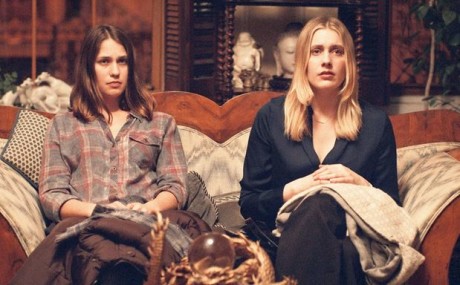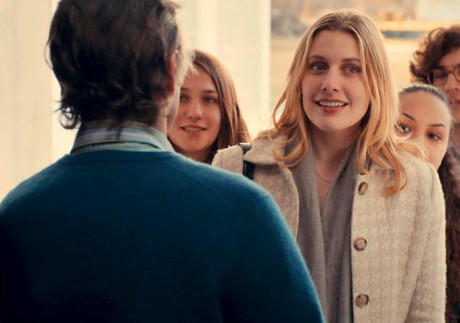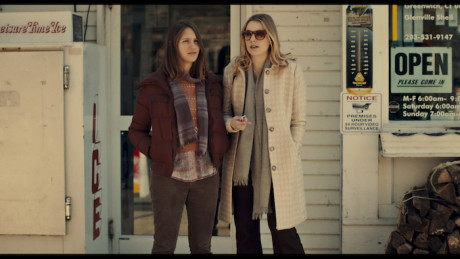The pleasure of meeting Greta Gerwig is all about energy. Her energy, that is. Just sitting casually across from you on a sofa, as she is today with me during a chat at Chicago’s Park Hyatt hotel, the screenwriter and actress radiates a sort of eccentric endearment. There’s a quicksilver wit to everything she says, even the most casual aside seeming borne of some momentary flash of inspiration.
The 33-year-old star, who has been delivering offbeat turns in scores of pictures over the last decade, is largely known as an “indie” phenom, adept at delivering original portraits of young women on the edge, often comically neurotic or searching, and Gerwig conveys such wanderlust with disarming girl-next-door-ness, a sunny blonde with an inventive esprit just beneath.
Notable in her canon are Frances Ha, Greenberg and now Mistress America, all collaborations with partner Noah Baumbach, and the films that have given voice to her signature issues of identity and youth. Gerwig co-scripted the Mistress America screenplay and has written herself a zinger of a role, a thirty-year-old Manhattanite whose put-together surface and zany persona mask something quite different.
Also joining us is Gerwig’s Mistress co-star, Lola Kirke, the rising young actress so memorable as the shady motel grifter in David Fincher’s Gone Girl and a real find in the role of Tracy, the college freshman writer who gloms onto the older woman for a story but learns a bit about life in the process. In person, the statuesque and charismatic Kirke betrays her low-key, onscreen counterpart, the perfect foil to Gerwig’s more confident, would-be career woman.
Lola, I thought you were very effective in the film’s opening scenes, particularly during the icebreaker mixers on campus. There’s a scene where you are sitting on the floor that really pulled me in.
LK: Those icebreaker games are horrific, and I am so glad that Greta and Noah decided to include them.
GG: Oh, God. Those ice-breaker games in college? I remember playing those and that’s why they got in there.
LK: Me too. They treat you like you are eleven when you first get to college. I’m like, ‘When can I have sex and do drugs?’
GG: For me, I was going to all of the orientation activities and doing everything that they said I had to do. And this girl, who ended up being a very good friend, said to me, ‘Nobody goes. Only crazies go.’ Anyway it as funny. I was like, ‘You guys, we have a campus safety meeting in ten minutes!’ But I was just so worried I was going to get kicked out that I was slavish to following rules.
Not anymore though?
GG: Now I am just caution to the wind! I am still kind of a rule follower.
The movie is an homage to classic screwball comedies, but also very much about women’s friendship, something underserved in the movies that we don’t see often enough.
LK: This and Beaches.
It’s only been about four decades. (laughter) It hasn’t been a bad year for women in the movies with the success of Trainwreck, Charlize carrying Mad Max and the big success of Pitch Perfect 2, created by women. Were you thinking about that when you wrote this film?
GG: Pitch Perfect 2? (laughter) Yes, I mean, I’m a woman and have some of my most vivid relationships in life are with both my best friends and peers, which is really what we were exploring in Frances Ha, and with women who are older than me who have been mentor figures that I have idolized, which we were doing in this movie. And then also with my mother and sister and people older and younger than me. I feel like there are so many permutations of intimacy amongst women in a platonic way that it feels like there are not enough stories told about it. And I am really fascinated by it. And I really feel the sisterhood! And I am so proud of the women who are making films about their experiences and showing up as who they are, not an idealized version of themselves. I did go to women’s college and an all-girls’ Catholic high school, so in some ways, my world really felt like it was filled with women. So I think maybe when we are writing together it really gets reflected in that.
LK: Likewise, I grew up with two sisters and my mom…
GG: Who looks like a sister!
LK: And a mom who was like twenty women in one and then a whole slew of female cousins. And just have always had large groups of girlfriends around me. It is really sacred to me. I think there is something about being, ‘I don’t like hanging out with other women; I’m a man’s woman,’ which when I was younger I thought that was the cool way to be…
GG: It was sort of presented as the cool way to be! There was a whole thing in my generation—Lola you’re a little young for this—in Dawson’s Creek, which everybody watched…
LK: I did watch Dawson’s Creek!
GG: I didn’t because I didn’t have a TV. But Dawson and Joey were best friends. And Joey didn’t really have friends that were cool. It seemed so cool that you had this best guy friend. And I think it’s cool that I have lots of male friends and I think men are wonderful, but I think for me the defining thing was a whole lot of ladies.
LK: Definitely. Was that a quote from Florence Nightingale that said, ‘There’s a special place in hell for women who don’t help other women?’
It was Taylor Swift recently. (laughter)
GG: It’s been improperly attributed to lots of women. And I think it was actually the woman- I’m blanking on her name! Sometimes that quote has been used in such a way that I think is inappropriate, which is to tear down another woman.
LK: I was going to say that I think there is a special place in heaven to tell stories about other women in an awesome way! Will you tweet that for me?
LS: I will! One of Mistress America’s most distinct and special qualities is the notion of repartee in the dialogue. It’s very stylized and quick. Greta, your performance is a bit of a high-wire in how large it is, and certainly the spirit of Carole Lombard is in there.
GG: Yeah! I love those movies; the screwball comedies. I have an instant connection with them because they are so theatrical. Some of them are literally filmed plays, but even in the ones that are not it’s the privacy of language- the language is so important and the style of acting is totally real and grounded, but it’s big as well and I love that kind of performance. My screen idol is Carole Lombard in Twentieth Century and To Be or Not to Be. She did not meet an emotion that came small, and it’s great because it never makes you feel like she is not a real person and it somehow makes her more real because of the vividness of her acting. We were looking at Bringing Up Baby; the way they moved the action to Connecticut is a tip of the hat to that one. And then George Cukor’s Holiday, in the way it all happens in the room upstairs. And To Be or Not to Be, with all of the changing of the costumes.
One of the great pleasures of it, even though it is difficult to balance and hard to film because it is so many people and so much of it is in the timing and it takes a lot of time to perfect, is watching all of the actors really let it rip and go for it. You get the feeling when you are shooting those big sequences with a lot of people that you really usually only get onstage. And that is that everyone is working together and it is all on each other. That is just fun to see, and everyone in the movie is such a good actor that they shine that way.
Yet I was very touched by the quiet scene where you realize a key character is not going to invest in your business venture, and you have a line where you say, ‘I like to drink.’
GG: I know. ‘I like to drink.’ I know.
There is so much high style in your portrait and then it all comes down at that moment and it’s almost heartbreaking.
GG: Yeah. I think one of the reasons the screwball approach works for this movie is because Brooke is such a performing person, but her performance is really in some ways covering for her intense vulnerability and insecurity, which is often the case. There are a few moments where she just shows herself to be someone who doesn’t really know what is going on at all, and yeah, those things kind of kill me and I’m glad they are in there.
One of the issues in the movie that’s most prominent is one of finding your own identity. Certainly that must be challenging in your business. What is that like in Hollywood for an actress today?
LK: Oh, God. I think it can definitely be jarring to move into and out of different identities that you hope to be able to shift into. This is a great line of work. But I think that has to be really private as well, and is best done not on a job.
GG: I am grateful for all of the ways I have gone through this business, but there have been times when I have tried to be someone I am not because I thought that it was what everyone wanted. And those are the times that I regret. And then I think, ‘No, you should have just been who you are.’ Lola, in addition to being a great actress and a great person is a young actress who so solidly knows who she is, and excuse my French, doesn’t give a fuck who you want her to be and she just lets her talent shine. And I feel like this sounds goofy, but I think she is such a good role model for actresses who are coming up (Kirke laughs), because you don’t have to make yourself be what men’s magazines like or what everybody has apparently decided is perfect. There is no perfect and your imperfections are what make you who you are. Your imperfections make you strong. Lola stands by it! I don’t even know if she knows is, but it’s awesome! She’s in a movie with Tom Cruise coming up! She didn’t get there by trying to be someone else, she got there because she was herself. That’s awesome.
LK: Keep goin!
GG: Don’t shave you armpits!
LS: On that note…






